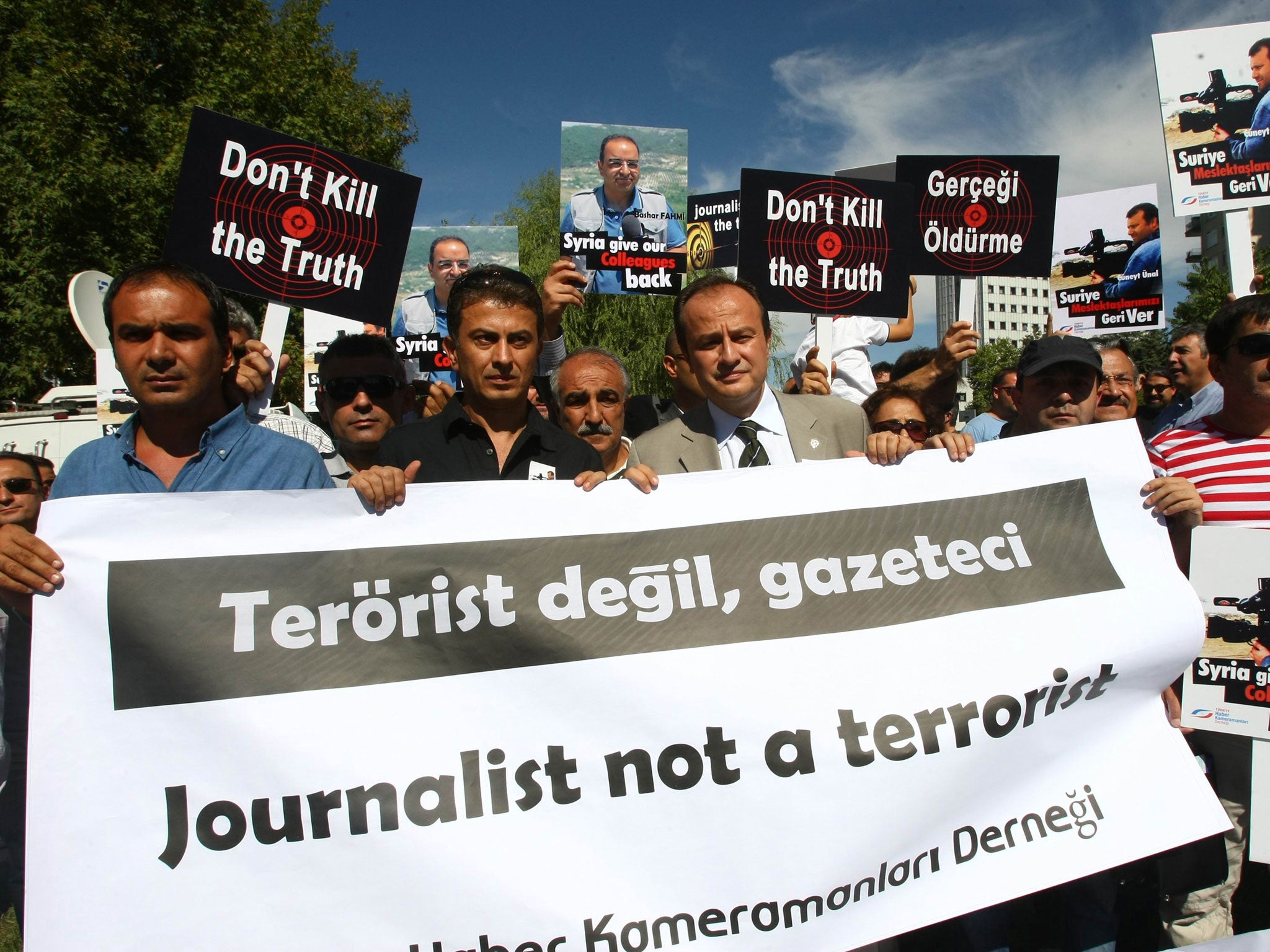Voices In Danger: Journalism in the line of fire
Journalists risk their lives every day and many are jailed, or even killed, for revealing what others want hidden. Today, we launch a campaign to give them their voices back


It was the murder of Anna Politkovskaya that brought home to me the importance of journalistic freedom. Anna, who worked for my family’s campaigning newspaper Novaya Gazeta, was murdered at her block of flats in Moscow after running a series of exposés of Russian atrocities in Chechnya.
The hitman shot her five times. Usually cautious about her security, she had been distracted by the recent death of her father and the needs of her pregnant daughter and sick mother. This lack of care about her own wellbeing meant she had been keeping a regular routine before her assassin struck. We now know that she was being watched by a sophisticated operation including agents of the CIAD official investigation bureau.
We are still no closer to finding out who ordered the hit. The investigation by police has been hopeless. It is largely because of Novaya Gazeta’s own inquiries that we know about the involvement of the CIAD agents.
That she died for upsetting people in high places is without doubt. At Novaya Gazeta, she is sadly not alone. The paper has had five staff killed now, including the shocking double murder in a Moscow street of our journalist Anastasia Baburova and a lawyer, Stanislav Markelov.
But Novaya Gazeta and its dedicated staff continue to work on stories exposing the wrongdoing of Russia’s most powerful people and organisations, facing the threat of violence and attack every day.
Only last year, the head of Russia’s version of the FBI, Alexander Bastrykin, drove the paper’s deputy editor to the middle of a forest outside Moscow and threatened to have him killed after our exposées of corruption in his organisation.
Bastrykin is now spearheading a campaign in the Russian courts against my father Alexander, who has refused demands to muzzle the newspaper. Our family’s sources tell us there is a contract out on his head if he is jailed.
So I, and my family, know only too well what risks members of the media take in the course of their work.
Journalists understand the dangers they face in pursuing their stories, and put themselves in danger voluntarily. That is why, except in the most extreme of circumstances, they do not write or broadcast about the troubles of their trade. They want to tell other people’s stories, not be the story.
But I feel the pressures being felt by journalists operating under threat from despotic regimes, or being threatened by criminals in places where the police fail to protect them, deserve to be known. Despotic regimes which hamper and punish the freedom of speech that journalists represent deserve to be held to account. The Independent is famous for its foreign coverage, and our journalists in the field regularly come across appalling stories of mistreatment of local reporters coming under huge pressure just for doing their jobs.
Cases such as the Iranian blogger Sattar Beheshti, killed while in custody, make headlines in the international news. But there are thousands of others under threat who receive little or no publicity. In places like the paradise islands of the Maldives to the economic hot-houses of India and Brazil, intimidation, censorship and imprisonment are present.
That is why we are launching today a new section of our website – Voices in Danger – which will give prominence to the plight of journalists being harassed, attacked or pressurised. In collaboration with Reporters Without Borders UK and other NGOs, we will feature regular case studies, interviewing the subjects where possible, and featuring some of their most powerful work.
We want to use the Independent’s global reach and online audience of millions to put these often forgotten reporters on a major media platform.
We do this in support of our fellow journalists, and in support of World Press Freedom this Friday, 3 May.
We will be publicising the likes of Sadiye Eser, a reporter with a left-wing newspaper in Turkey who was arrested in December, making her the 61st in the country to be so treated. She was charged with being a member of a terrorist organisation and questioned about political rallies she had covered as a journalist – effectively doing her job.
According to a recent Reporters Without Borders study, Turkey is the “biggest prison for journalists” – particularly for ones of Kurdish origin. The Turkish government regularly claims those held are terrorists, although Reporters Without Borders has independently verified that, as of December, of the 72 media personnel held, at least 42 are bone fide journalists and four are media assistants held solely due to their media work.
In some cases, the journalists we profile will be talking from outside of their countries, having been forced to flee. They may ask us to use aliases as repressive regimes will often threaten to harm their families back home. They may have to speak through friends and colleagues due to their internment.
Voices in Danger will seek to expose and report on the most repressive countries, using, where we can, the words of the very journalists being stifled. If we are unable to reach them to tell their own stories, we will use the reports of reputable NGOs, the UN and other bodies. As well as publicising their cases, we also hope to be able to run some of their journalism, to give it the wide, global audience that The Independent and Independent Voices can reach.
You can help their causes by spreading their stories through social media, writing to your MPs or officials in their countries. We will provide contact details where we can.
These brave men and women have put their lives on the line to tell what they see as the truth about the countries in which they work. The least we can do is listen.
Evgeny Lebedev is the chairman of Independent Print Ltd and editor-in-chief of Independent Voices. For more details about the campaign, see Voices in Danger, here.
Join our commenting forum
Join thought-provoking conversations, follow other Independent readers and see their replies
0Comments